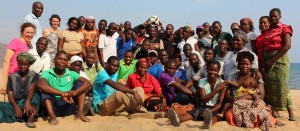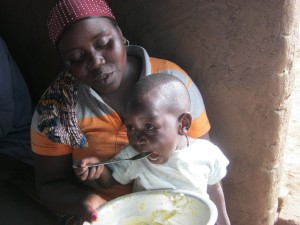"In many ways, Silvia lived within the specifics of Biblical and ecclesial interpretation of those celibate and poverty-vowing missionaries, and yet also mirrored the strength, independence and alternative view that female missionaries had inadvertently modelled: women can lead, teach, model the Christian life, serve their communities as well as men."
Silvia Walia died last week in her Lakeshore home–town of Metangula. I would guess that she was in her late 70’s. She was a life–long devoted member of the Anglican Church of Niassa (north of the Zambezi River in Mozambique, now four new dioceses of the new province of Mozambique and Angola, IAMA).
Silvia was the Mother’s Union Coordinator from 1996–2006. She took this position with the restructuring of the MU, after Monica Msossa had stepped down from 24 years as the MU President (a woman whose capabilities, in another time, might have seen her as a Bishop!). Silvia handed over her position with MU to Rosa Nhone, having trained Rosa in the ways of discipling women and how to support the work of the MU President, the Bishop’s wife, the clergy and other local leaders.
Silvia is one of those who saw MU in almost lay monastic terms – lay mothers, married or widowed – who took on leadership in a time when the Anglican church received from the Universities’ Mission to Central Africa (UMCA) missionaries was male–led and women were the ones who passed on the new ways of family life taught from the incoming Anglican Church culture after the 1880’s.
In many ways, Silvia (following Monica) lived within the specifics of Biblical and ecclesial interpretation of those celibate and poverty–vowing missionaries, and yet also mirrored the strength, independence and alternative view that female missionaries had inadvertently modelled: women can lead, teach, model the Christian life, serve their communities as well as men. African Traditional Religion, I was told by our Dean, Rev Franco Cacongue, never differentiated by gender. If the Spirit was evident in a life in the person who prayed for the community, for rain, for healing, they were the spiritual leaders to be followed.
It was the Anglican Church that determined how women and men could serve and lead worship, he said. The MU was the outlet for women’s spirituality and service, giving them a place in the Church.
Silvia was never as energetically travelling round the diocese in her capacity as MU Coordinator. Partly because of lack of episcopal leadership and vision in the earlier years, partly because of her own family responsibilities, partly because she knew her strength was in prayer and Bible study.
When Silvia travelled with the Bishop’s team, she would take the quiet part of prayer, whether in a boat, on a beach, walking between villages, and on entering a new village. When, in 2004, she was introduced to a Lectio Divina study of Scriptures that had been developed for small groups of largely illiterate people, she seemed to shine. She once told me that what she loved about this ‘new methodology’ was that everyone was encouraged to listen and speak, and everyone took something home from the study.
She took this way of studying Scriptures to many new communities, as did Rosa. I was told that this ‘new methodology’ (what I’ve heard called ‘African Bible Study’ here in the USA), by building women’s confidence to listen to God’s Spirit, speak in groups, share their insights, led to more women involved in singing psalms, reading, dancing and praying in churches.
Women told me that this Silvia–led Lectio Divina Bible study, alongside an opening up of MU to include married and widowed, as well as unmarried and divorced mothers, was the energy for growing the MU in the Diocese of Niassa from around 900 to 3,600 from 2003–15.
Silvia had memorized her Bible and she prayed.
All the time.
Mostly for others’ suffering.
Her eyes twinkled with mature wisdom.
But then there was the time when we worked together on a pilot study about trauma in communities. She led a large group of women with stories of long–held pain from the war years. Silvia had lost one whole family household when RENAMO rebels attacked her village, and all that remained was a cousin’s hat found on the path nearby. She knew God led through deep pain, so she strengthened grieving families with her prayers.
Silvia sang her prayer of praise as she was driven away from Heathrow for a visit to a church partner in London. She cried when a chicken dinner was offered by hosts in the UK and her grandchildren couldn’t share it. She lamented in prayer her understanding of her community’s poverty after experiencing the wealth of London.
She had nothing else to give but her prayers, but she told me that was her work. She knew the sacrifice of prayer for service.
She lived the heart of discipleship.
Helen Van Koevering, Lexington KY: Sept 11 2022




